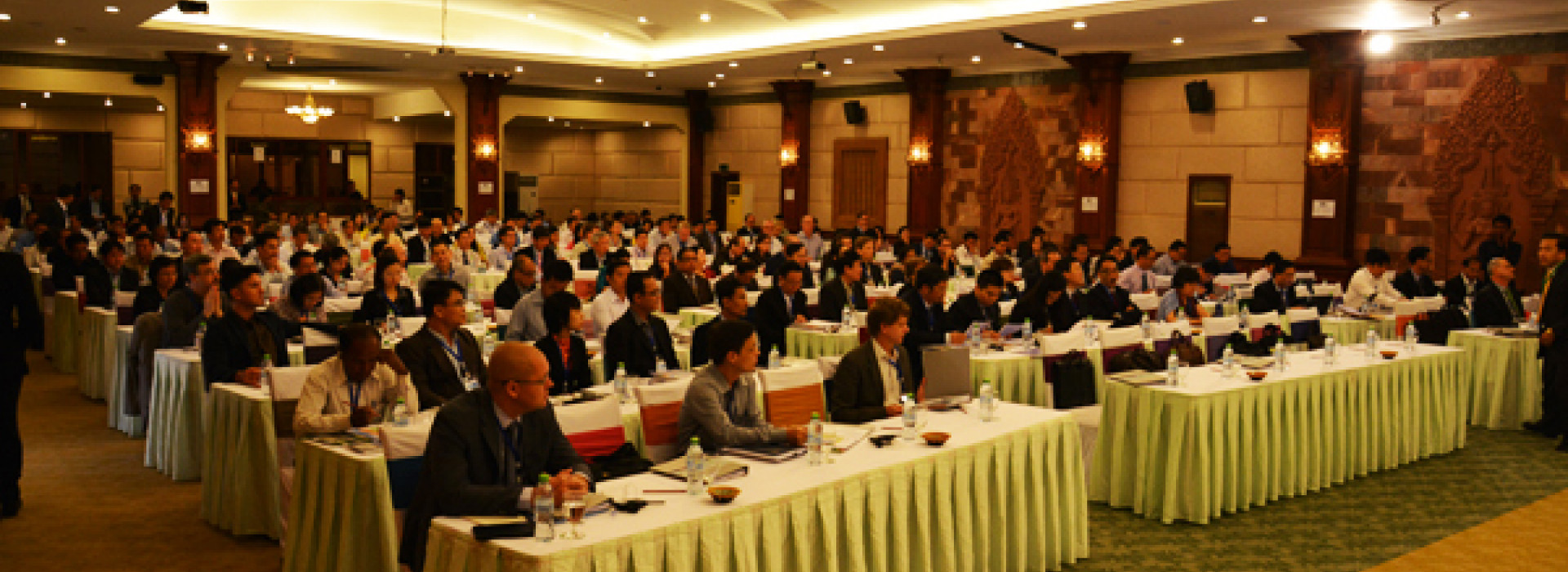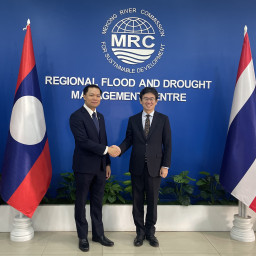MRC addresses long-term balanced development needs and strategies at regional forum
21 November 2014, Siem Reap, Cambodia — The Mekong River Commission (MRC) is holding the two-day event to involve stakeholders in the updating of the Mekong Basin Development Strategy. The strategy is reviewed and updated every five years to prescribe actions that should be taken by the MRC and relevant actors—working with counterparts at the regional and national levels—to strengthen cooperation, improve national development planning, address key gaps in knowledge and strengthen basin management procedures. Feedback from a wide-range of stakeholders is taken into account in the process
“The implementation of the Strategy has been contributing to the economic development in the Mekong region. A range of development opportunities has been captured, especially in the least developed parts of the Mekong basin, which help close the development gap and increase regional integration,” said H.E Mr. Lim Kean Hor, Minister for Water Resources and Meteorology of Cambodia in his opening remarks.
The Minister also acknowledge the need to address the limitations of the previous strategy and stressed that the new Basin Development Strategy should clearly define how the countries can improve their national plans to increase transboundary benefits and minimise impacts.
During the first day the forum also focused on assessing development trends and the long-term outlook of the Mekong region. For example, it is anticipated that regional benefit sharing, including the development of joint projects, will likely become even more urgent. Joint developments will lead to higher transboundary cooperation, which in turn will benefit many sectors such as food, energy, navigation, flood protection and tourism. This is what has occurred in more developed river basins in around the world.
The forum focused on the need to maximise the opportunities and manage the risks based on priorities including: expansion of irrigated agriculture, optimising hydropower development, adaptation to climate change, and capacity building for improved water resources management.
Stakeholders expressed concerns about the changing environment and the effect on their income-generating and food sources such as agriculture and fisheries and the need to address these issues effectively.
The Mekong Basin is entering a period of unprecedented change as the basin countries seek to address their long-term development needs. The countries are increasingly aware that a balance between economic gain and environmental and social protection has to be maintained to achieve their national and regional development goals.
The new strategy seeks to address challenges and assist the countries in cooperating and managing the basin effectively in light of future needs.
The event is taking place at the Apsara Angkor Resort and Conference, National Route 6, Airport Road, Kruos Village, Svay Dangkum Commune, Siem Reap, Cambodia. More information on the forum including an overview, format and programme, is available on the following link: http://www.mrcmekong.org/news-and-events/events/4th-bdp-regional-forum-on-the-basin-development-strategy/. Those interested in submitting their feedback for the development of the Basin Development Strategy can do so by clicking on following link:
Notes to editors:
The Mekong River Commission is the intergovernmental body responsible for cooperation on the sustainable management of the Mekong Basin whose members include Cambodia, Thailand, Laos and Viet Nam. It was established to promote cooperation among its members and thus it is not a supranational or regulatory body.
The MRC is the intergovernmental body responsible for cooperation on the sustainable management of the Mekong Basin whose members include Cambodia, Lao PDR, Thailand and Viet Nam. It is established to promote cooperation amongst the Member Countries and thus it is not a supra-national or regulatory body.
In dealing with this challenge, the commission looks across all sectors including sustaining fisheries, identifying opportunities for agriculture, maintaining the freedom of navigation, flood management and preserving important ecosystems. Superimposed on these are the future effects of more extreme floods, prolonged drought and sea level rise associated with climate change. In providing its advice, the MRC aims to facilitate a broad range of dialogue among governments, the private sector and civil society.
The MRC Secretariat provides technical, advisory and administrative services to the member states. It facilitates regional meetings of the Member Countries and provides technical advice on joint planning, coordination and cooperation. It also works closely with the four countries’ coordinating bodies, the National Mekong Committees (NMCs), and other state agencies. Currently, the People’s Republic of China and the Union of Myanmar are engaged as MRC Dialogue Partners.
-END-





